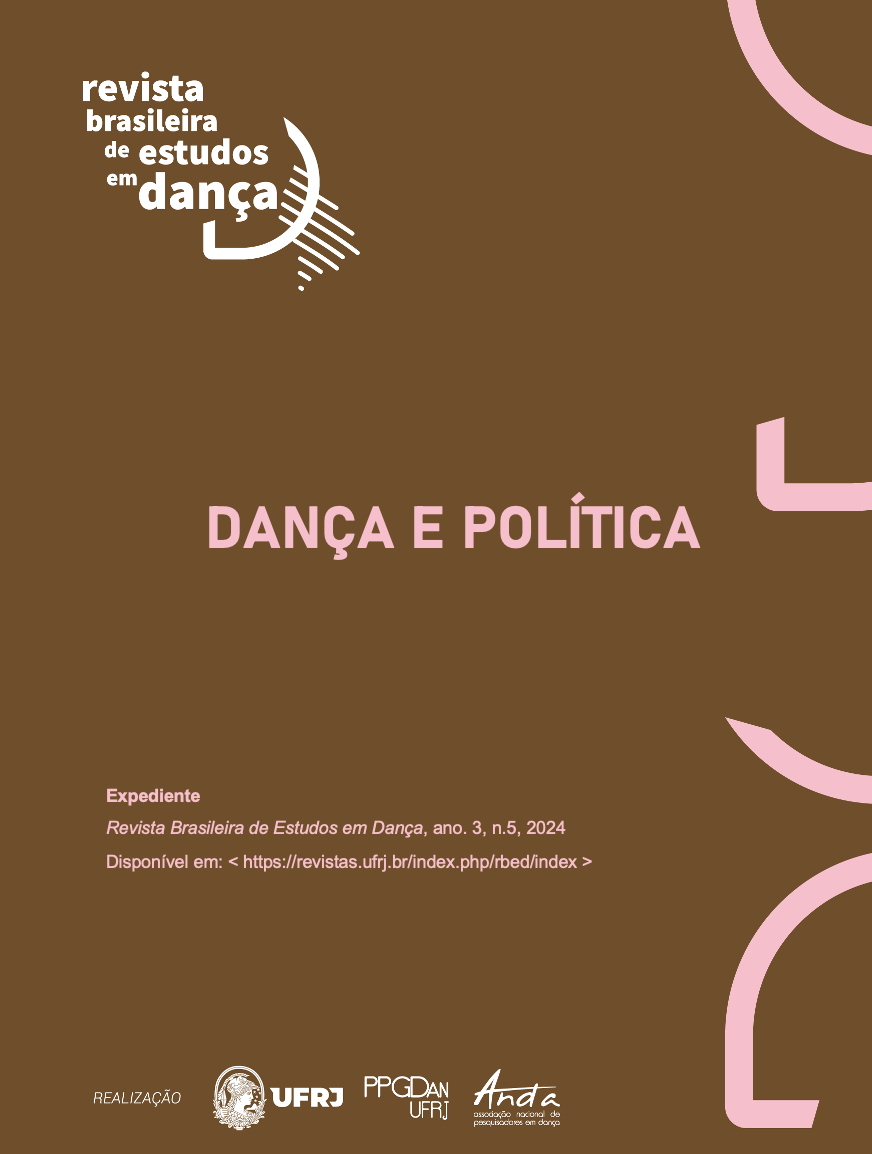When insolents dance...
DOI:
https://doi.org/10.58786/rbed.2024.v3.n5.64197Abstract
The article When insolents dance... brings together four dance experiences shared by artist-researchers. The aim is to present creative processes developed between 2021 and 2024, entangled with the concepts of insolence, insurgency and insurrection. Experiment 1, Partilhas Insolentes-Aweté Katu, presents plural discussions about insolence, freedom, disobedience and metamorphosis, in a video dance format. Experience 2, Quando insolentes dançam..., the theme of the Araraquara International Dance Festival 2022, is a tribute by curators Gilsamara Moura and Ailton Krenak to Pinar Selek - a Turkish woman exiled in France, human rights activist and persecuted for 26 years. Experience 3, Insolence 5: I love dancing with the ways of saying things, is a work in process that presents actions such as dancing and resisting. And Insolence 4: the feeling that everything is possible, a creation in residence that brings together artists from Brazil, Paraguay, Mexico, France and Palestine.
References
COCCIA, Emanuele. Métamorphoses. Paris: Éditions Payot & Rivages: 2020.
CRUTZEN, Paul & STOERMER, Eugene. The “Anthropocene”. In Global Change Newsletter, 41: 2000, 17-18.
GAMBLIN, Guillaume. L’insolente: dialogues avec Pinar Selek. Paris/France: Éditions Cambourakis, 2019.
GREINER, Christine. Corpo: Pistas para Estudos Indisciplinares. São Paulo: Annablume, 2005.
GUERRERO ARIAS, Patricio. Corazonar. Una antropología comprometida con la vida: miradas otras desde Abya-Ayala para la descolonización del poder, del saber y del ser. Quito: Ediciones Abya-Yala, 2010.
KATZ, Helena Tania. Um, dois, três: a dança é o pensamento do corpo. Belo Horizonte: Editora: FID, 2005.
KRENAK, Ailton. Ideias para adiar o fim do mundo. São Paulo: Companhia das Letras, 2019.
__________. A vida não é útil. São Paulo: Companhia das Letras, 2020.
__________. O futuro não está à venda. São Paulo: Companhia das Letras, 2020.
__________. Futuro Ancestral. São Paulo: Companhia das Letras, 2023.
LUGONES, María. Rumo a um feminismo descolonial. Revista Estudos Feministas, Florianópolis, 2014. v. 22, n. 3, p. 935-952, set.-dez.
MANNING, Erin & MASSUMI, Brian. Pensée en Acte, vingt propositions pour la recherche-création. Paris: les presses du reel, 2018.
ROLNIK, Suely. Esferas da insurreição: notas para uma vida não cafetinada. São Paulo: n-1 edições, 2018.
SANTOS, Antonio Bispos dos. A terra dá, a terra quer. São Paulo: Ubu Editora: 2023.
SELEK, Pinar. Loin de chez moi, mais jusqu’où?... Collectif de Solidarité. Donnemarie-Dontilly. Éditions iXe, 2012.
________. Parce qu’ils sont arméniens. Paris: Éditions Liana Levi, 2015.
________. La máscara de la verdad. Libélula Verde Ediciones: Barcelona, 2020.
VERGÈS, Françoise. Um feminismo decolonial / Françoise Vergès; traduzido por Jamille Pinheiro Dias e Raquel Camargo. Título original: Un féminisme décolonial. São Paulo: Ubu Editora, 2020.
ZIZEK, Slavoj. A visão em paralaxe. São Paulo: Boitempo, 2008.
Published
How to Cite
Issue
Section
License
Authors who publish in the Revista Brasileira de Estudos em Dança are
responsible for the content of signed articles and retain copyright.
They grant the journal the right of first publication with the work simultaneously
licensed under the Creative Commons Attribution-NonCommercial 4.0 License
(Open Archives Initiative - OAI). This feature, used for open-access journals,
allows sharing work for non-commercial purposes and acknowledges
authorship. If the text is later published in another vehicle, the author
must inform that it was initially published as an article in the Revista Brasileira
de Estudos em Dança. Therefore, even if the journal owns the first publication,
authors are entitled to publish their work in institutional repositories or on
their personal pages, even if the editorial process has not been completed.
The journal reserves the right to make normative, orthographic, and grammatical changes to maintain the language standard, respecting the authorial style.

